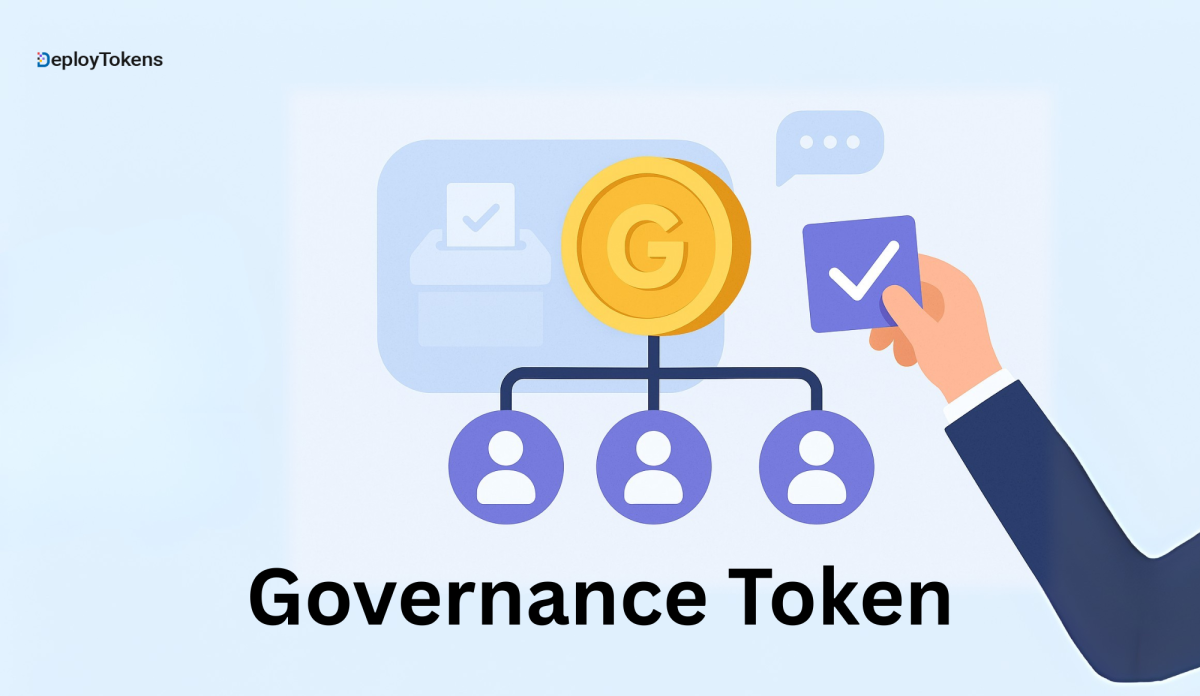In traditional companies, decisions come from the top down. But in a DAO, power is distributed among its members, guided by smart contracts instead of human managers. That leads to an important question: If there’s no central authority, how do DAOs make crucial decisions like approving updates, funding projects, or managing millions in assets?
The answer lies in governance tokens, the digital keys to decentralized decision-making. These tokens give users voting rights and help shape how a DAO operates. More importantly, they create a governance token mechanism that ensures trust, fairness, and transparency across the system. Let’s break down how this mechanism works and why it’s transforming the future of organizational governance.
What Are Governance Tokens?
A governance token works like a digital share or membership badge in a decentralized network. If you hold one, you have a voice in the system. Governance tokens are a type of cryptocurrency that give holders the power to vote on proposals — such as protocol upgrades, transaction fees, or treasury fund management.
In other words, they let users participate in how a project evolves. The more tokens you hold, the more influence you have in decision-making.
These tokens are usually distributed through:
-
Initial Coin Offerings (ICOs)
-
Airdrops
-
Participation rewards
This model keeps power in the hands of the community, aligning everyone’s incentives around the project’s success.
How the Governance Token Mechanism Works
The governance token mechanism determines how votes are cast, counted, and executed in a DAO. At its core, it follows a simple principle:
Your voting power equals your token ownership.
Let’s look at how this works step by step.
1. Token-Weighted Voting
The most common governance token mechanism is token-weighted voting.
-
Each token represents one vote.
-
The more tokens you own, the greater your voting influence.
For example, in MakerDAO, holders of the MKR token vote on parameters like collateral requirements and risk management. This ensures that those most invested in the system’s success have a stronger say in how it operates.
2. Submitting and Executing Proposals
Here’s what typically happens inside a DAO:
-
Proposal Creation: A member suggests a change (for example, updating the protocol or allocating funds).
-
Voting Period: Token holders cast their votes based on their token holdings.
-
Consensus Threshold: If a set percentage (say, 51%) approves the proposal, it passes.
-
Automatic Execution: Once approved, smart contracts automatically carry out the decision — without needing human approval.
This automation guarantees that decisions are transparent, tamper-proof, and free from manipulation.
3. Advanced Governance Models
As DAOs mature, many are experimenting with improved governance token mechanisms to create fairer systems.
-
Quadratic Voting: Each additional vote costs more tokens, making it expensive to dominate the voting process. This ensures smaller holders can still influence outcomes.
-
Delegated Voting (Liquid Democracy): Token holders can delegate their votes to trusted representatives who specialize in governance decisions. This approach balances expertise with community participation.
These alternative models are helping DAOs evolve beyond the simple “one token, one vote” system.
How Governance Tokens Build Trust and Transparency
The governance token mechanism solves two major issues that plague traditional organizations lack of transparency and centralized control. Here’s how DAOs tackle both.
1. Radical Transparency
Every vote, transaction, and rule within a DAO exists on a public blockchain that visible to anyone.
-
All governance data is open and verifiable.
-
Smart contracts automatically enforce the results.
-
No hidden agendas or private decision-making.
This transparency helps build community confidence, since everything from proposal discussions to final votes can be independently audited.
As one DAO enthusiast put it:
“There’s no one behind the scenes who can take the money and run.”
2. Built-In Accountability
Because governance tokens have financial value, members are directly invested in the organization’s success. If they act irresponsibly or support poor decisions, the value of their tokens can drop and creating a strong incentive to act in the DAO’s best interest. Some DAOs even include mechanisms like slashing, which penalize bad actors or failed proposals by burning part of their tokens.
This creates a powerful feedback loop of accountability and responsible governance.
Real-World Examples of Governance Token Mechanisms
| DAO Project | Governance Token | Governance Mechanism Overview |
|---|---|---|
| MakerDAO | MKR | Token holders vote on risk management, collateral requirements, and DAI stability fees. |
| Uniswap | UNI | Members propose and vote on protocol upgrades and fee adjustments. |
| Compound | COMP | Users decide on new asset listings and interest rate updates. The project is fully governed by token holders. |
| Aave | AAVE | Token holders vote on protocol updates, risk parameters, and staking mechanisms. |
Each project shows a slightly different governance token mechanism, but all share one principle community-driven decision-making.
Challenges in Governance Token Systems
Despite their promise, governance tokens aren’t perfect. DAOs still face some practical challenges:
-
Centralization Risks: If a few large holders (whales) own most tokens, they can dominate decisions and recreating centralization.
-
Voter Apathy: Many token holders don’t participate in votes, reducing the legitimacy of outcomes.
-
Complexity: The technical process of voting and proposal management can be confusing or slow for newcomers.
Overcoming these challenges is key to building more balanced and efficient decentralized systems.
Final Thoughts
Governance tokens are much more than digital assets and they represent the foundation of decentralized democracy.
Through a well-designed governance token mechanism, DAOs can:
-
Enable open participation
-
Automate decision-making
-
Build trust through transparency
As DAOs continue to evolve, these mechanisms will become smarter, fairer, and more inclusive — shaping the future of decentralized collaboration. In the world of DAOs, trust isn’t just promised but it’s programmed.
